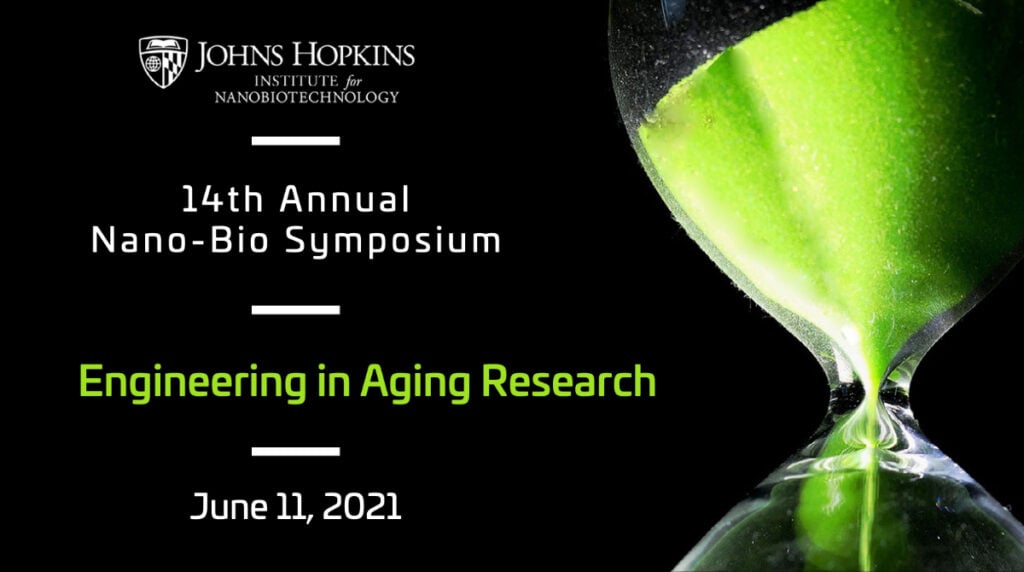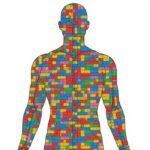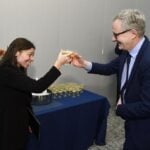Engineering in Aging Research: Highlights of the 14th Nano-Bio Symposium

Population projections from U.S. census data shows that by the year 2050 the 65-year-old population will double and 20% of the population will be over 60 years-old. With a growing aging population comes concerns about socio-economic burdens, quality of life, age-associated disabilities, multi-morbidities, healthcare costs, and more.
To provide a fresh perspective on aging and aging research, experts from the Johns Hopkins Whiting School of Engineering, Johns Hopkins School of Medicine, and the National Institute of Aging were invited to speak at the INBT’s 14th Nano-Bio Symposium on Engineering in Aging Research.
“This year’s topic—the role of engineering in aging research—could not be more critical, more timely, and more exciting. Engineering—and engineers—are vital to our ability to predict, identify, understand, and address the many biological processes and health risks associated with aging,” said T.E. Schlesinger, the Benjamin T. Rome Dean at the Whiting School of Engineering.
Topics discussed included the biophysical changes to cells, tissues, and the surrounding tissues as people age, the effects of aging on cancer, and a panel discussion on how bioengineers can work with clinicians, biologists, and industry to further advance aging research.
New this year was hosting the annual event virtually on the Zoom platform given the COVID-19 pandemic and subsequent social distancing regulations. Despite changes to the usual in-person format, the virtual platform made attending the event more accessible to people outside of Baltimore and Maryland. Attendees were located across the United States, such as California, Oklahoma, New York, and Puerto Rico, and around the globe, including Canada, India, Sri Lanka, and the Philippines.
Through interdisciplinary collaborations, engineers, scientists, and physicians, can more fully inform the next generation of prevention, treatment, and diagnostic strategies targeting the health and well-being of older adults.
Speakers
Luigi Ferrucci, MD, PhD
Scientific Director, National Institute on Aging, National Institute of Health
Aging Well in the 21st Century: Strategic Directions for Research on Aging
Ashani T. Weeraratna, PhD
Bloomberg Distinguished Professor of Cancer Biology
Professor and E.V. McCollum Chair of Biochemistry and Molecular Biology, Johns Hopkins Bloomberg School of Public Health
Age Against the Machine: How Aging Disrupts the Homeostasis of Cancer
How Bioengineers May Help to Shape the Future of Aging Research
Denis Wirtz, PhD
Vice Provost for Research, Johns Hopkins University, Professor of Chemical and Biomolecular Engineering, and Theophilus Halley Smoot Professor in the Department of Chemical and Biomolecular Engineering
Mark Anderson, MD, PhD
Director, Department of Medicine, Johns Hopkins University School of Medicine, and William Osler Professor of Medicine
Sharon Gerecht, PhD
Director at the Institute for NanoBioTechnology, Professor of Chemical and Biomolecular Engineering, Johns Hopkins University, and Edward J. Schaefer Professor in Engineering
T.E. Schlesinger, PhD
Benjamin T. Rome Dean, Whiting School of Engineering, Johns Hopkins University and Professor of Electrical and Computer Engineering
Jeremy Walston, MD
Raymond and Anna Lublin Professor of Geriatric Medicine and Gerontology, Johns Hopkins University School of Medicine
Jude Phillip, PhD
Assistant Professor of Biomedical Engineering, Johns Hopkins School of Medicine, and Core Faculty, INBT
Human Aging at Cell-Resolution
Peter Abadir, MD
Associate Professor of Medicine, Johns Hopkins University School of Medicine and Division of Geriatrics Medicine and Gerontology, Department of Medicine
The Biology of Frail Angiotensin System Translated: Worn-out Mitochondria to Poor Wound Healing
Luo Gu, PhD
Assistant Professor of Materials Science and Engineering, Johns Hopkins University, and Associate Faculty, INBT
Age-related Mechanical Factors and their Effects on the Activity of Astrocytes
Gabsang Lee, PhD
Associate Professor of Neurology, Institute for Cell Engineering, Departments of Neurology and Neuroscience. Johns Hopkins University School of Medicine
Modeling ‘Aged’ Human Neurons with Optical Aggregation of Alpha-synuclein
Jin Han, PhD
Postdoctoral Fellow in the Department of Biomedical Engineering, Johns Hopkins School of Medicine
Regenerative Medicine in an Aging Environment: How Aging Impairs Therapeutic Response
Latest Posts
-
 Year in Review 2025
January 5, 2026
Year in Review 2025
January 5, 2026
-
 Cellular building blocks may enable new understanding of the body’s “machinery”
December 19, 2025
Cellular building blocks may enable new understanding of the body’s “machinery”
December 19, 2025
-
 Biomedical Engineer Jamie Spangler Receives President’s Frontier Award
December 15, 2025
Biomedical Engineer Jamie Spangler Receives President’s Frontier Award
December 15, 2025


